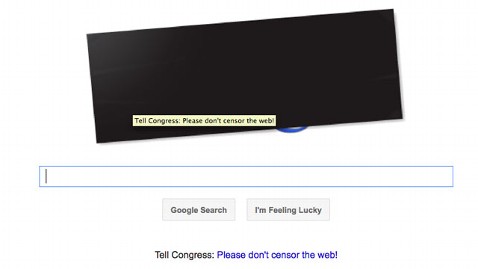SOPA-PIPA Protest: What's Next?

Google homepage Wednesday, protesting PIPA and SOPA in Congress.
Wikipedia's English-language page is back to normal today; Google's logo is its regular brightly colored self. Many supporters of Wednesday's online protest against SOPA and PIPA - the Stop Online Piracy Act in the House and the Protect IP Act in the Senate - say it was effective. And, significantly, at least a dozen senators who supported the bill, according to various head counts, have now publicly backed off.
"We can find a solution that will protect lawful content. But this bill is flawed & that's why I'm withdrawing my support," said Sen. Roy Blunt (R-Mo.), a former PIPA co-sponsor, on Twitter Wednesday.
"Protecting IP is important, but we need to carefully tailor the solution," tweeted Sen. Jeff Merkley, an Oregon Democrat. "#PIPA and #SOPA don't cut it."
The White House said that as of late Wednesday, 104,000 people had signed "We the People petitions asking the Obama Administration to protect an open and innovative internet."
Jimmy Wales, the head of Wikipedia, said 162 million people clicked on his site's message opposing the bills. "Now 35 Senators publicly opposing #PIPA, up from 5 last week! 41 no votes and we win," he tweeted today.
So are the bills dead? In their existing forms they were already in trouble. The House version had been put on hold by House Majority Leader Eric Cantor (R-Va.) even before Wednesday's protest. And in the Senate, Sen. Patrick Leahy (D-Vt.), an original co-sponsor, had last week promised amendments to address the concerns of website managers.
A reminder of the basic issue: Movie studios, music publishers and other content providers (such as Time Warner and Disney, which is the parent of ABC News) said they were threatened by digital "piracy" of what they created - of people making digital copies online of films, music and writing instead of buying the originals. Internet companies (such as Google and Craigslist) said that was a perfectly valid concern, but the bills in Congress overdid it - they would have forced Internet providers to block access to sites accused of spreading video or music without permission, and could have blocked search engines even from providing links to them.
The U.S. Chamber of Commerce, one of the most public advocates of the two anti-piracy bills, said it sent a letter to members of Congress, standing by its original position but noting that the bills were being reworked.
"[T]he Chamber urges the full Senate to fully debate and pass this important measure," said the Chamber. "Recent announcements by sponsors of the legislation have made clear that important issues of internet operation, security, and freedom will be addressed by a manager's amendment, which will modify provisions of S. 968 dealing with blocking of rogue sites. The amended legislation is a more narrowly tailored approach designed to target the worst offenders."
Michael Gartenberg of Gartner technology consultants said in a phone interview with ABC News that Wednesday's protest alone may not have tipped the balance, but "it raised awareness of an important issue.
"This isn't a matter of right versus wrong, left versus right, good versus evil," he said. "It's a complex issue with a lot of nuance. But it took it out of the arena of politicians and technologists and brought it to the public's attention."
"What we saw was the voice of the people," said Gartenberg. "It restores the nature of what a republic should be."